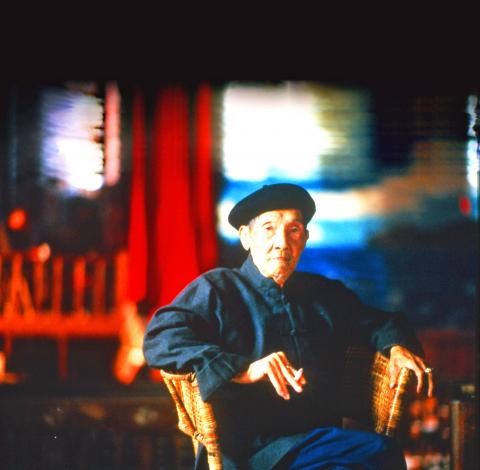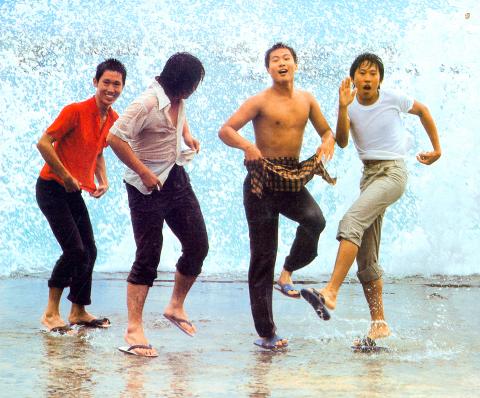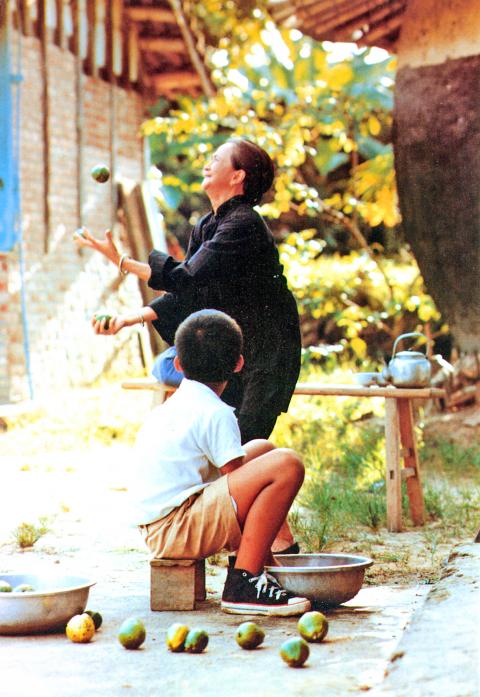The year was 1991. American film critic Jonathan Rosenbaum was experiencing his first authentic night out in Taipei at a late night karaoke party hosted by renowned Taiwanese film director Hou Hsiao-Hsien (侯孝賢). Fueled by bottles of cognac and a generous supply of betel nuts, the duo belted out Beatles songs until 3am before stumbling home.
Having reviewed Dust in the Wind (戀戀風塵, 1986) and A City of Sadness (悲情城市, 1989) for the Chicago Reader, long-time film critic Rosenbaum was no stranger to Hou’s work. But being in Taipei for the Asia-Pacific Film Festival gave him a better appreciation of the local culture, history and setting.
“I was able to spend my 19 days there less as a tourist than as a part of everyday life in Taipei,” said Rosenbaum, who was in New York this past week for the retrospective “Also Like Life: The Films of Hou Hsiao-hsien” at the Museum of the Moving Image.

Photo Courtesy of Center for Moving Image Arts, Bard College
TAIWANESE NEW WAVE
The early 1990s was a crucial time for a film critic to be visiting Taiwan since the industry had recently undergone major changes. In contrast to kungfu and melodrama, the New Wave of the 1980s introduced an element of realism to Taiwanese cinema akin to Italian neorealism, and Hou was the central figure driving the movement.
Rather than presenting viewers with drawn-out fight scenes or heart-wrenching tragedies, films of this period dealt with the everyday realities of working class life in Taiwan. Concentrating on such banalities may not seem too exciting, but the movement was groundbreaking because up until then, the films being produced lacked an emphasis on Taiwanese history.

Photo Courtesy of Center for Moving Image Arts, Bard College
As Rosenbaum told the Taipei Times, “Taiwanese history is such a taboo subject that when it gets ‘discovered’ it’s very important.”
RETROSPECTIVE
Organized by Taiwan’s Ministry of Culture, the Taiwan Film Institute, Taipei Cultural Center in New York and the Center for Moving Image Arts at Bard College, the touring retrospective “Also Like Life” is currently in New York until Oct. 17 before making stops in other US cities.

Photo Courtesy of Center for Moving Image Arts, Bard College
Film critics and organizers of the retrospective are hoping that it will raise awareness of Taiwanese history amongst American audiences.
“Although Hou is very widely recognized among American cinephiles as a master, his mainstream reputation in the US remains unfortunately limited, because of the low distribution of his films and the confused and partial understanding in the US of Taiwanese history,” Rosenbaum said.
Richard Suchenski from Bard College also noted that the distribution of foreign art cinema in North America over the past decade in particular has been increasingly sparse. As the main organizer of the retrospective, he spent two years searching for and compiling Hou’s films on the best possible 35mm prints in preparation for the retrospective.
Suchenski told the Taipei Times that “this is a very rare opportunity to see these remarkable films projected and I am thrilled that so many people are taking advantage of it.”
He added that the screenings have been attracting “very diverse audiences that include many young cinephiles.”
‘THE SANDWICH MAN’ AND THE TAIWANESE IDENTITY (CRISIS)
The Oct. 5 screening of The Sandwich Man (兒子的大玩偶, 1983) drew a diverse mixture of film buffs. The majority of viewers were not Taiwanese. The choice of film was interesting because Hou’s segment of the three-part film is almost entirely in Hoklo (commonly known as Taiwanese). Furthermore, it presents viewers with a heads-on confrontation of the question of what it means to be Taiwanese.
A compilation of three vignettes from Hou and directors Tseng Chuang-hsiang (曾壯祥) and Wan Jen (萬仁), The Sandwich Man explores the humdrum experience of working class life in 1960s Taiwan with a simplicity that is beautiful and intriguing.
As Suchenski said, “salient features of Hou’s cinema include elegantly staged long takes and the precise delineation of quotidian life.”
In other words, each vignette is not so much about dramatizing the tragic dimensions of poverty, but rather exploring how the characters find ways to be happy despite their seemingly abject condition living in “exile.” In doing so, the subjects begin to form a new social identity — a Taiwanese identity.
“The Sandwich Man expresses the existential dilemma of being Taiwanese better than any other film — the problem that arises from pretending to be someone else temporarily and then finding that this temporary identity had become one’s main social identity,” Rosenbaum said.
Hou may not be as famous as Ang Lee (李安) is in the US, but his films, as the retrospective has shown, have played a pivotal role in the redefinition of Taiwanese identity.
As for the drunken karaoke scene which Rosenbaum recalled from his 1991 visit — it could easily have been set in present day Taipei, except the cognac would be replaced with something more local, perhaps Taiwan Beer.

In Taiwan there are two economies: the shiny high tech export economy epitomized by Taiwan Semiconductor Manufacturing Co (TSMC, 台積電) and its outsized effect on global supply chains, and the domestic economy, driven by construction and powered by flows of gravel, sand and government contracts. The latter supports the former: we can have an economy without TSMC, but we can’t have one without construction. The labor shortage has heavily impacted public construction in Taiwan. For example, the first phase of the MRT Wanda Line in Taipei, originally slated for next year, has been pushed back to 2027. The government

July 22 to July 28 The Love River’s (愛河) four-decade run as the host of Kaohsiung’s annual dragon boat races came to an abrupt end in 1971 — the once pristine waterway had become too polluted. The 1970 event was infamous for the putrid stench permeating the air, exacerbated by contestants splashing water and sludge onto the shore and even the onlookers. The relocation of the festivities officially marked the “death” of the river, whose condition had rapidly deteriorated during the previous decade. The myriad factories upstream were only partly to blame; as Kaohsiung’s population boomed in the 1960s, all household

Allegations of corruption against three heavyweight politicians from the three major parties are big in the news now. On Wednesday, prosecutors indicted Hsinchu County Commissioner Yang Wen-ke (楊文科) of the Chinese Nationalist Party (KMT), a judgment is expected this week in the case involving Hsinchu Mayor Ann Kao (高虹安) of the Taiwan People’s Party (TPP) and former deputy premier and Taoyuan Mayor Cheng Wen-tsan (鄭文燦) of the Democratic Progressive Party (DPP) is being held incommunicado in prison. Unlike the other two cases, Cheng’s case has generated considerable speculation, rumors, suspicions and conspiracy theories from both the pan-blue and pan-green camps.

Stepping inside Waley Art (水谷藝術) in Taipei’s historic Wanhua District (萬華區) one leaves the motorcycle growl and air-conditioner purr of the street and enters a very different sonic realm. Speakers hiss, machines whir and objects chime from all five floors of the shophouse-turned- contemporary art gallery (including the basement). “It’s a bit of a metaphor, the stacking of gallery floors is like the layering of sounds,” observes Australian conceptual artist Samuel Beilby, whose audio installation HZ & Machinic Paragenesis occupies the ground floor of the gallery space. He’s not wrong. Put ‘em in a Box (我們把它都裝在一個盒子裡), which runs until Aug. 18, invites